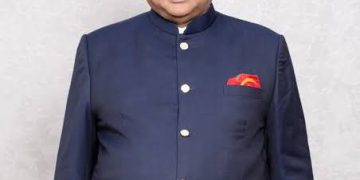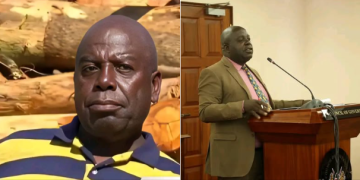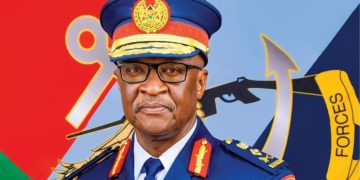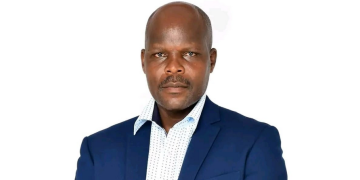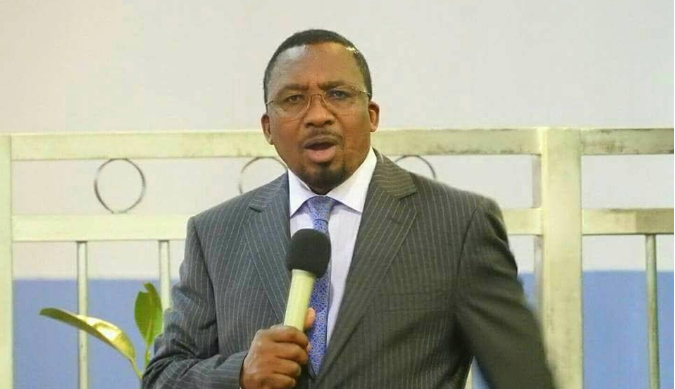Education profile
Fredrick is the Academic Director, MBA programs, Director of the Institute of Strategy and Competiveness and Senior Lecturer of Strategy and Decision Making at Strathmore Business School. He is also a Director, Strategy and Investments of Property Reality Company and also sits on the Arch Diocese of Nairobi Health Board
Fredrick is a Part-time Professor of IESE Business School, the Leading Business School in Executive Education in the world and Holds a Visiting Professor Position of University of St. Gallen, the Best University in German Speaking Europe. He is a consultant on Strategy formulation, Strategy Execution and Change Management

He holds PhD in Management Science and Innovation with a focus on Strategy and Execution from ESADE Business School Barcelona Spain, a Master in Management Science and Innovation from ESADE Business, an MBA- Strategic Management from Catholic University of Eastern Africa, a BA Social Sciences- Psychology- Uganda Martyrs University and a BA Philosophy from Pontificia Università Urbaniana, Rome Italy.
Frederick is member of European Business Ethics Network (EBEN) and European Academy of Business In Society (EABIS)
Family and controversy
Fredrick’s marital life is rock with controversies after he married his late wife’s cousin.
According to him, he was allowed him to marry his late wife’s first cousin against Taita tradition for a guy to marry multiple women from the same family.
He implored his in-laws while describing the hierarchy of values; that there are personal values, religious values, and traditional values, using his sociological knowledge from seminary years ago.
“I told them that traditional values do not want us to get married but personal values and religious values are not against it,” he says.
“So, with that conviction, they allowed me to marry her (Herima Chao), on condition that there was nothing like bride price ceremonies because you can’t pay bride price to the same clan twice. She is the first cousin of my late wife,” he says.
Now they have a daughter together.
That marriage is interesting when you consider the fact that Dr Ogola spent 21 days in police custody in January 2018 due to suspicions that he had killed his wife, Rebecca Gobi Mwachongo.
It is a story that grabbed the headlines for days. He was playing with Rebecca at their house and she fell. Thinking she was just acting, he left, only to be told later by the house help that she had barely moved. He rushed her to hospital, where she later died.
Initial suspicions were that he killed his wife by hitting her. But a post-mortem showed that Rebecca, who was aged 27 and who had given birth just six weeks before her death, had clots in the blood and fluid in her lungs. None of this was linked to violence or malice, and Dr Ogola was finally freed.
His in-laws had initially been tough on him but when they got the whole story, they mellowed. His marriage to Herima, Rebecca’s cousin, restored the bridge that was damaged.
“We are very happily married and it also helped the two families to heal. For example, my family would not have been happy at all to hear I’m marrying from that family after the incident. But now that we’re married and they accepted Herima in the family, that has helped us to have closure,” says Dr Ogola.
“Also, their family saw that we didn’t hate them after the incident. It is their family that accused me of having killed their daughter. It is not the police who arrested me, because I’d got all the documents like the death notice that was issued for taking the body to the mortuary. But the family accused me of having killed their daughter, and I think the (second) marriage brought a lot of reconciliation between the two families. I’m living happily now and I think I’m very happy with my social life. I’m looking forward to a very bright future with that family,” he says.
As a couple, they are now raising Matisse, who was six weeks old when his mother died on January 1, 2018; and their daughter.
“We happened to meet during (Rebecca’s) funeral but that’s not how it happened. It came to happen much later,” he says.
Dr Ogola is discussing the incident with Lifestyle because he has grouped it among the four major crises that have shaped the trajectory of his 45 years on earth.
Another one of the four is being expelled from the seminary in 2006 after nearly nine years of preparation to be a priest.
There were also allegations that he plagiarised an article he submitted to a newspaper for publication — which was later confuted. It nearly cost him his job at Strathmore University and he says it was a product of “corporate politics”.
Another crisis is a remark he was told in the 1980s as a primary school student in Siaya that, given the poverty that plagued his family, however much he studied, he wouldn’t amount to much. Dr Ogola is the sixth born of 11 children in a family that operated between Nairobi’s Kibera and Siaya. His father was a catechist while his mother was a nursery school teacher. Hardly was there food at home.
The message that he would not go far in life gave him a push to study hard and the marks he scored in KCPE moved a Dutch priest, Fr Gerald Mooij, to award him a scholarship to St Mary’s School, Yala. He remembers going back home from school with sugar and other products — he was providing for his parents rather than the other way round.
After St Mary’s, he briefly stayed in Mombasa, where he founded a school, but he later joined the seminary. He was at the cusp of becoming a priest when he was expelled on claims of racism.
“I was in a European-founded seminary under the Mill Hill Missionaries, and of course, there were more white than black people. And you know this sibling rivalry among the black people. Somebody told my superior that I hate white people. And of course that was not true. Those were just rivalries happening there. When I was called, I was not given a chance to defend myself. I was told I’m dismissed because I hate white people,” he says.
He hardly hesitates when asked about the date he was kicked out of the seminary: May 5, 2006. By then, he had three undergraduate degrees — in theology, philosophy, sociology, and in urban planning and city policing.
He notes that he does not regret one bit about his stay in the seminary because he came out with the degrees.
Also because one of his elder brothers is a priest, his mother was more welcoming of the idea of him terminating the journey to priesthood because she did not want to “lose two sons to the church”.
“But I remained very faithful to the (Catholic) Church. In our upbringing, church was everything. I owe most of the things to the church,” he says.
After leaving the seminary, Dr Ogola says he created a 10-year strategic plan.
“I said that in 10 years – which was from 2006 to 2016 – I needed to be either a C-suite executive or a top professor in Africa.”
He could not immediately decide which one of the two paths he would take; so he started with pursuing the path towards being an executive.

That led him to taking a Masters of Business Administration at the Catholic University of Eastern Africa (CUEA). He later secured a job at Housing Finance Corporation as a banker. But he left upon realising he wasn’t cut for the 8-to-5 life.
“I didn’t look like the guy who does day-to-day work, coming to a desk 8-to-5. I was that person who was curious; who wanted to know more. And I also wanted an environment which was not highly controlled because I believed that in a highly controlled environment, I could not thrive,” he says.
Upon his resignation from Housing Finance, where he says he used to be paid Sh60,000 a month in the late 2000s, he returned to CUEA to be the understudy of a lecturer. His target was the lecturer’s laptop and internet connection.
“I resigned to go and volunteer to work with one faculty (member) in his office; just arranging his books, earning nothing, really. But I wanted to become an academic, so that was the journey I had to take,” narrates Dr Ogola. “What I wanted to access was a laptop in his office, and he was very busy teaching.”
Using the laptop, he took the Graduate Management Admission Test and passed so well that a number of universities offered to take him in.
One of them was Esade Business School in Barcelona that offered to pay his tuition, accommodation fees besides paying for his flight tickets. He took up the offer.
At Esade, he did another master’s degree and his PhD. For both courses, he specialised in management science and innovation.
“By obtaining my PhD in 2012, I now had five undergraduate degrees, two masters and a PhD. Then I came to work in Strathmore Business School as a lecturer,” he says.
Today, he is director of the MBA programme at the Strathmore University Business School, the director of the Institute of Strategy and Competitiveness and also a senior lecturer of strategy and decision making.

Because being a top lecturer requires industry practice, he founded a company called TrailBlazer Business Strategies. Through the firm, he has prepared a number of strategic plans , mostly for universities.
He tells Lifestyle that the number of plans he has written are about 1,000. Most of them involve him bidding to prepare the plan, before winning the tender.
“You win according to the terms of reference,” he says, adding that his rich CV sometimes helps him beat top institutions to get the chance to create strategic plans.
Some of the entities he has worked with, he says, include the Kenya National Highways Authority, the Federation of Kenya Employers, the Institute of Certified Secretaries, TransCentury, Stima Sacco, among others.
Other institutions whose board members he says he has trained include Amref, Crystal Ventures (Rwanda), Trade and Development Bank, Stima Sacco, Federation of Kenya Employers, Apex Porter Novelli, the State Department Cooperatives, among others.
His engagement sometimes involves advising on new markets.
“There are cases where an individual comes and tells you, ‘I want to make this decision: should I go to DR Congo or not?’ So, you sit down, propose to them what you need from them, and you quote what you want, you agree; they give you an offer. You do an analysis and give them the advice. Sometimes the advice is ‘do not go’, but they have spent like Sh6 million on you. But it’s good to tell them not to go to DR Congo because they could spend Sh50 million or Sh80 million and still not succeed rather than spending Sh6 million on you,” he says.
Strategic plans, he says, are mere pieces of paper unless the entity that requests for them has specifics on executing them and is committed to the cause.
Drawing from his experience in drafting strategic plans, he has written his first solely-authored book, titled Strategic Thinking: 10 Lessons from 1,000 Strategic Plans.
The book was launched on Thursday morning at Strathmore University’s TransCentury Auditorium. The chief guest was Mr Mugo Kibati, the CEO of Telkom Kenya, with whom Dr Ogola interacted when they were working together to tie up the loose ends of Vision 2030 — the government’s plan adopted in 2008 towards sustained transformation in the social, political and economic fronts.
“If you have a personal strategy to succeed in life, you need to read this book. At the same time, if you are running a company, you also need to read this book,” says Dr Ogola.
“I would recommend the C-suite executives to read this book and get the picture of what could help them avoid the 10 (common) mistakes,” he adds.
Earlier in the year, Dr Ogola was in the race towards becoming the Ugenya MP on an ODM ticket. But when opinion polls were done as a nomination method, he came second and he let the matter rest.
“I scored 32 per cent popularity according to pollsters. The leader had 35 per cent and the third had 19 per cent,” he says. “According to party rules, I was to be called to negotiate with the man who was first since he didn’t get an outright win because of the margin of error. But this didn’t happen as he was given a direct ticket.”
He goes on: “I moved on and I am happy not to run as an independent candidate since I am a loyal supporter of the party. It was not about me but the Ugenya people.”
Besides creating strategic plans, Dr Ogola says he has also designed a number of curricula being used to train learners in Kenya and beyond.
He also holds training sessions with company executives, regularly writes opinions in local newspapers and co-owns a hospital in Kitengela .
He believes that a person should have a variety of income sources to spread the risk.
“I discovered that if Strathmore gives me 100 per cent of my annual income and they sack me, I’m dead. But now Strathmore gives me 10 per cent of my annual income and this is not a coincidence. I sat down to de-risk my income because I was seeing that I was exposed; that someone can wake up and sack me. That’s why I own a company,” he says.
So, has his post-seminary ambition of becoming a top professor in Africa come true? He believes so.
“I’m possibly the best in strategy and corporate governance,” he says confidently. “Bring me any professor who has these things and I’ll agree he’s the best.”
Source: Nation.Africa


